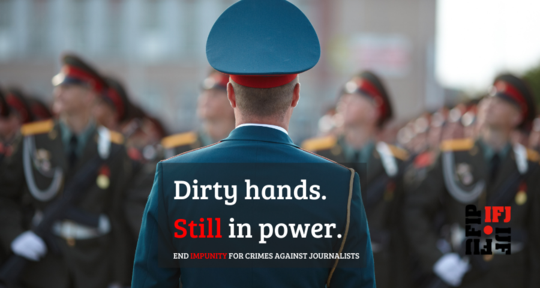Critical journalism can be dangerous in Russia. 17 journalists have been murdered in the past 15 years. All of them were Russian journalists, many reporting on corruption, human rights abuses or rights violations by authorities or the police. Attacks have been particularly widespread in the North Caucasus region. Some trials have taken place but, often, the masterminds behind those crimes remain free.
Media freedom in Russia is under attack from two sides. Firstly, broadcasters, newspapers or websites have been increasingly brought under state control or were bought by state-affiliated companies and oligarchs to ensure propaganda-like reporting in favour of the government. In April 2020, journalists at Vedomosti, one of Russia’s last independent newspapers, voiced their concerns over growing pro-Kremlin censorship after the newspaper was sold to new owners and demanded the newly installed chief editor Andrey Shmarov step down over his attempts to censor articles.
Secondly, the remaining independent media outlets and their journalists are attacked and threatened by authorities or powerful individuals, pressuring them to self-censor.
In the 1990s, the number of attacks on journalists increased dramatically in Russia. The number of crimes grew, journalists were beaten, killed, cruelly and cynically. However, "despite strong pressure and constant threats, Russia was developing at the same time its own unique school of investigative, professional journalism," the Russian Union of Journalists recalls.
While killers are tried, masterminds walk free
One of the most prominent cases of impunity is the killing of Anna Politkovskaya from Novaya Gazetawho was shot dead in October 2006. The journalist was well-known for her reporting on human rights abuses by the Russian military in Chechnya. The investigations into her murder and the following series of trials were characterized by various setbacks and inconsistencies. In June 2014, five perpetrators were sentenced to prison terms but to date, the mastermind behind the crime has not been found.
Mikhail Beketov, editor-in-chief of the Khimki Pravda newspaper, was left disabled after a murder attempt in 2008. He died from health complications related to the assault in April 2013. None of the assailants who had beaten Beketov with metal rods were identified.
In the murders of Timur Kuashev in 2014 and Akhmednabi Akhmednabiyev in 2013 none of the killers have been found.
Nikolai Potapov who exposed corruption of local authorities was shot dead in May 2013. Three men were sentenced to jail terms for his murder but neither of them had a personal motive. However, the case was closed without finding the person who ordered the murder.
Nine years after the murder of Gadzhimurad Kamalov in 2011, four men who had organised and committed the murder were finally brought before court in October this year. The case will be heard by the Southern District Military Court in Rostov-on-Don.
Harassment continues
The statistics on attacks and killings of journalists have dropped significantly nowadays. The Russian Union of Journalists (RUJ) has developed a database of violations of the rights of journalists in Russia - protectmedia.org, with the help of which the union tracks all crimes and journalists' rights' violations - "one of the small but important steps on this path", RUJ says.
But the situation remains grim. In 2020, the Council of Europe’s Platform for the Protection of Journalism and Safety of Journalists registered 13 violations of press freedom in Russia, among them death threats, arrests, beatings and assaults.
On 2 October 2020, Russian news editor Irina Slavina set herself on fire in front of the police headquarters in Nizhniy Novgorod in Western Russia. She died at the scene. Before setting herself on fire, Slavina published a post on Facebook which stated: “For my death, please blame the Russian Federation.”
One day before her self-immolation, Slavina reported that police raided her flat searching for material related to the pro-democracy group Open Russia. Slavina had faced years of harassment by Russian authorities for her work reporting on the pro-opposition movement and organizing marches, according to news reports.
Another alarming incident that must be investigated is the attack against journalist and photographer David Frenkel who was assaulted and seriously injured by policemen while covering voting for a constitutional amendment at a polling station in St. Petersburg on 2 July 2020.
Legislation threatening journalists
Besides physical attacks, legislation protecting picture rights or state secrets and anti-terrorism laws are frequently used to take action against critical coverage.
Russian President Putin signed a controversial law in December 2019 which allows classifying freelancers working for foreign funded media outlets as “foreign agents”. Subsequently, they have to adhere to strict registration rules and can be fined up to approximately 1600 US dollars or be detained for up to 15 days for repeated violations.
In July 2020, former journalist Ivan Safronov who currently works as an adviser to the head of the Russian space agency was arrested on charges of “treason” for allegedly sharing state secrets during his previous journalistic work. To date (21 October) he remains in jail.
Radio journalist Svetlana Prokopyeva was fined 500,000 rubles (around 6.000€) in July 2020 for allegedly “justifying terrorism” in a column she wrote about a suicide attack on the federal security service (FSB) in 2018.
RUJ Executive Secretary and International Director, Tim Shafir, said: “Journalists remain at the forefront of the fight against crime, corruption and violations of the law. Their labour and social rights are still under threat, many of the grave crimes against our colleagues are not fully investigated, the criminals are not brought to justice. Together with fraternal unions from the International Federations, RUJ is making every possible effort to ensure that the journalist profession is not only respected, socially significant, but also safe. We continue our daily struggle for the safety of our colleagues and to end violence against journalists, to end impunity."

